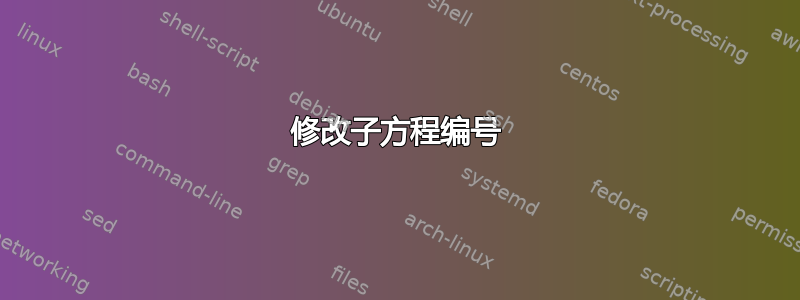
我目前正在重新定义数学环境中的编号,但遇到了一个问题subbequations。
我希望我有一个这样的编号系统:
等式 1.(针对正规方程)
等式 1.A(子方程)
如果我把
\documentclass[12pt]{article}
\usepackage[utf8]{inputenc}
\usepackage[T1]{fontenc}
\usepackage[leqno]{amsmath}
\usepackage{unicode-math}
\usepackage{etoolbox}
\usepackage{unicode-math}
\makeatletter
\renewcommand\theequation{%
\@arabic\c@equation.%
}
\renewcommand\tagform@[1]{%
\maketag@@@{%
\textbf{\textsc{Eq}.~\ignorespaces#1\unskip}
}%
}
\makeatother
\patchcmd\subequations
{\def\theequation{\theparentequation\alph{equation}}}
{\def\theequation{\theparentequation\protect\Alph{equation}}}
{}
{\FAIL}
\begin{document}
\begin{equation}
(a+b)^2 = a^2 + 2 a b + b^2
\label{eq1}
\end{equation}
Some text... \ref{eq1}
\begin{subequations}
\begin{equation}
f(x) = a x + b
\end{equation}
\begin{equation}
g(x) = q x + s
\end{equation}
\begin{equation}
h(x) = t x + b
\end{equation}
\end{subequations}
\end{document}
我有Eq. 1.A。但是如果我使用\ref{eq1}例如,我有1.而不是1。
如果我把
\renewcommand\theequation{%
\@arabic\c@equation%
}
\renewcommand\tagform@[1]{%
\maketag@@@{%
\textbf{\textsc{Eq}.~\ignorespaces#1.\unskip}
}%
}
\patchcmd\subequations % nouvelle numérotation pour les sous-équations
{\def\theequation{\theparentequation\alph{equation}}}
{\def\theequation{\theparentequation.\protect\Alph{equation}}}
{}
{\FAIL}
我没有问题,\ref{eq1}但是我已经得到了Eq. 1.A.。
附加信息:
@egreg 这是我定义的一个命令,用于对方程进行编号,但我在这里用 替换了它,以Alph{}简化事情,我忘记删除它了。谢谢你向我指出这一点。
谢谢@muzimuzhi!但这并不是我想要的。对于正规方程,我希望在方程编号后面有一个点。
因此正确的编号应该是:
等式 1.
等式 2.A
等式 2.B
等式 2.C
所以会有一个点“。“阿拉伯数字后有空格,大写字母后则无空格。
答案1
在下面的例子中,我提供了一个\p@equation在 内部使用的strange-defined \stepcounter{<counter>}。也许还有更优雅的解决方案。
\documentclass[12pt]{article}
\usepackage[utf8]{inputenc}
\usepackage[T1]{fontenc}
\usepackage[leqno]{amsmath}
\usepackage{etoolbox}
\usepackage{unicode-math}
\makeatletter
\renewcommand\theequation{%
\@arabic\c@equation.%
}
\renewcommand\tagform@[1]{%
\maketag@@@{%
\textbf{\textsc{Eq}.~\ignorespaces#1\unskip}
}%
}
\patchcmd\subequations
{\def\theequation{\theparentequation\alph{equation}}}
{\def\theequation{\theparentequation\Alph{equation}}}
{}
{\FAIL}
\def\p@equation#1{\expandafter\delete@trailing@dot\expanded{#1}.\@nil}
\def\delete@trailing@dot#1.#2.#3\@nil{\ifx\relax#2\relax#1\else#1.#2\fi}
\makeatother
\begin{document}
\begin{equation}
(a+b)^2 = a^2 + 2 a b + b^2 \label{eq1}
\end{equation}
Some text... \ref{eq1} and \ref{eq2a}
\begin{subequations}
\begin{align}
f(x) = a x + b \label{eq2a}\\
g(x) = q x + s \\
h(x) = t x + b
\end{align}
\end{subequations}
\end{document}



